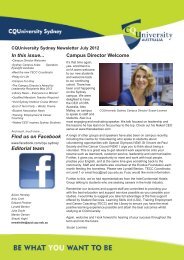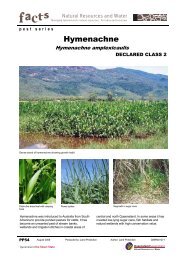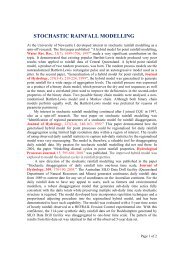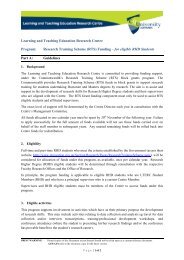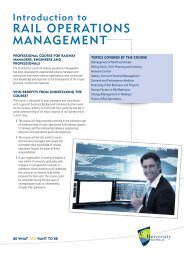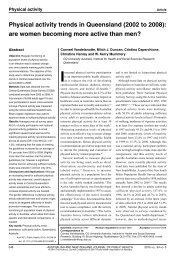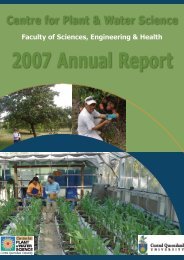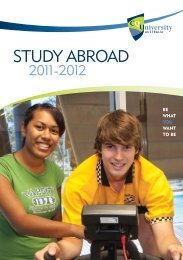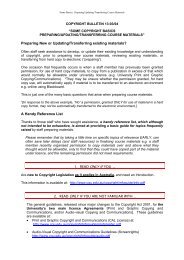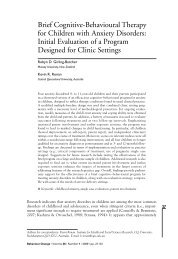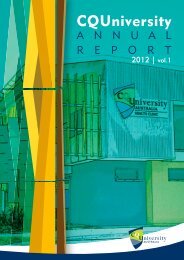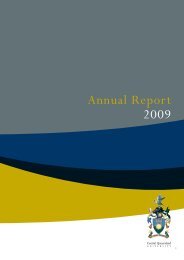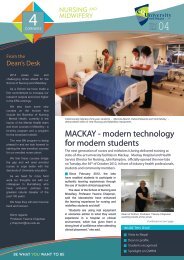Annual Report 2008 - Central Queensland University
Annual Report 2008 - Central Queensland University
Annual Report 2008 - Central Queensland University
Create successful ePaper yourself
Turn your PDF publications into a flip-book with our unique Google optimized e-Paper software.
CENTRE FOR MUCOSAL IMMUNOLOGY<br />
This group, led by Professor Jennelle Kyd, investigates the causes of respiratory and<br />
middle ear infections and understanding bacterial interactions to seek solutions in<br />
order to identify mechanisms for disease prevention. The research is predominantly<br />
funded by National Health and Medical Research Council (NHMRC) grants and<br />
works closely with health researchers and the medical research industries.<br />
Education Research<br />
This is a new research priority and is being led by Professor Paul Rodan. It brings<br />
together researchers and is developing new research programs in the following areas:<br />
• International education research on policy, graduate attributes, language and culture.<br />
• Pedagogy, curriculum and delivery modes.<br />
• Education policy and practice.<br />
Cooperative Research Centres (CRCS)<br />
The Cooperative Research Centre (CRC) program was established by the Australian<br />
Government to strengthen links between industry, research organisations,<br />
educational institutions and government agencies. During <strong>2008</strong>, CQ<strong>University</strong> was a<br />
Research Partner in two CRCs, described below. CQ<strong>University</strong> was also an Affiliate<br />
in the Cotton Catchment Communities Research CRC.<br />
CRC FOR RAILWAY INNOVATION<br />
A new CRC for Rail Innovation commenced activity in 2007, replacing the previous<br />
CRC for Railway Engineering and Technologies which was hosted by CQ<strong>University</strong>.<br />
CQ<strong>University</strong> remains the lead institution, however the new company structure has<br />
its own independent headquarters in Brisbane. The previous Rail CRC had reached<br />
the end of its six year funding period, having delivered over 40 projects. The CRC<br />
program will contribute $21 million, with a further cash and in-kind contribution of<br />
approximately $80 million from the new CRC for Rail Innovation core participants.<br />
Following the conclusion of the original Rail CRC, a company called Rail Innovation<br />
Australia Pty Ltd was created to hold the intellectual property developed and to seek<br />
to commercialise key technologies. Rail Innovation Australia Pty Ltd will be based at<br />
CQ<strong>University</strong> Rockhampton. www.railcrc.net.au<br />
CAST CRC<br />
The CAST Cooperative Research Centre commenced in July 2005. The Centre<br />
continues and extends research related activities on light metals previously carried<br />
out by the CRC for CAST Metals Manufacturing from 1999 to 2005 and the CRC<br />
for Alloy and Solidification Technology, which operated between 1993 and 1999.<br />
CAST is recognised as a strategic asset to the light metals industry in Australia<br />
through partnerships developed between complementary groups within Australia’s<br />
research, industry, education and government sectors. The structure and<br />
management of CAST underpins the Centre’s success in taking innovative research<br />
from the realm of abstract ideas to providing solutions to problems facing the<br />
Australian light metals industry. www.cast.org.au<br />
Quality and Impact of Research Outcomes<br />
The <strong>University</strong> was successful in both ARC and NH&MRC grant rounds.<br />
The development of training and peer review processes has improved the<br />
competitiveness of applications to the competitive grant funding agencies.<br />
CQ<strong>University</strong><br />
has developed<br />
a national and<br />
international<br />
reputation for<br />
research projects<br />
of relevance to the<br />
railway industry. In<br />
a sector where even<br />
small improvements<br />
can mean millions<br />
of dollars in savings,<br />
and where safety is<br />
of huge importance,<br />
our leading role<br />
has been crucial to<br />
development of the<br />
resource industries<br />
which underpin our<br />
economy.<br />
Rail OZ-ECP brake technology for trains developed in the Centre for Rail<br />
Engineering and the Rail CRC was successfully funded under commercialization<br />
competitive funding for final product development phases. This research product<br />
is expected to increase Australian rail network capacity, increase safety, decrease<br />
stopping distances and provide a cheaper capital upgrade cost for rail operators than<br />
existing technologies on the international market. It is now being commercialized<br />
61



